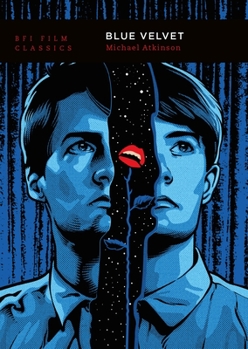Blue Velvet
(Part of the BFI Film Classics Series)
For many, Blue Velvet is David Lynch's masterpiece. It represents a unique act of cinema: an 80s Hollywood studio film as radical, visionary and cabalistic as anything found in the avant-garde; a mysteriously symbolic and subterranean 'cult' movie that nevertheless has recognisable stars and was broadly distributed; a genre piece with the ambience of a fearsome, hyper-composed nightmare; an American 'art film' by Hollywood's only reputable 'art film' director.
Michael Atkinson's intricate and layered reading of the film shows how crystallises many of Lynch's chief preoccupations: the evil and violence underlying the surface of suburbia, the seedy by-ways of sexuality, the frightening appearance of the adult world to a child's eyes, presenting it as the definitive expression of the traumatized innocence which characterizes Lynch's work. In his afterword to this new edition, Atkinson situates Blue Velvet within a culture that has changed drastically in the 35 years since its release, and in doing so, he considers the film's lasting significance as it slowly turns from contemporary phenomenon to an interpretable artifact.Format:Paperback
Language:English
ISBN:1839023716
ISBN13:9781839023712
Release Date:November 2021
Publisher:British Film Institute
Length:88 Pages
Weight:0.30 lbs.
Dimensions:0.3" x 5.3" x 7.3"
Customer Reviews
4 ratings
Suggestive study of an endlessly fascinating masterwork.
Published by Thriftbooks.com User , 23 years ago
In the decade and a half between his pioneering 'Blue Velvet' and recent renaissance with 'Mulholland Drive', David Lynch's reputation had seriously plummeted, his name a synonym for kitschy, affectless weirdness. It's good to be reminded what a major filmmaker he could be, and Michael Atkinson claims 'Velvet' as the most important and influential film of the 80s. Although the film deals with areas of human behaviour, psychology and sexuality we'd prefer not to think about, and is full of reeling violence and disorienting cinematic procedures, Atkinson argues that Lynch is ultimately a conservative artist, affirming a childlike, pre-Oedipal innocence by vividly portraying its dark, disjunctive opposite. This thesis is arguable to say the least, and Atkinson himself isn't always very convinced by it. Using a loose psychoanalytic framework, he discusses 'Velvet' as a psychodrama, a narrative unleashing of the Id, with Jeffrey as a kind of Alice or fairy-tale figure undergoing the harrowing, identity-threatening psychic journey to maturity. You may disagree with Atkinson's wider conclusions, but his attentive, close reading of the film pays justice to its full, ambiguous complexity, singling out Lynch's idiosyncratic use of colour, composition and the widescreen frame; his manipulation of physical space in psychic space; the equal importance of his 'aural design' to his visuals; his unexpected sensitivity to class and gender politics; his use of performance (Atkinson brilliantly recuperates the famously vicious Frank (Dennis Hopper)). Each passing insight adds layers to the film's suggestibility, without ever hoping to tie it up, so bound up is Lynch's aesthetic to his own impenetrable demons. Atkinson has an annoying habit of repeating alienating buzzwords like 'interface' and 'topoi', where clearer words will do; his contention that 'Velvet' is a 'pure' movie, untainted by cinema history, is simply wrong (Douglas Sirk and Hitchcock's 'Vertigo' are obvious precedents for a start), and his interpretation of Lynch's Dennis Potter-like use of song is way off the mark. But if you want to tease out some of the stranger mysteries of Lynch's beautiful and enigmatic film, this is the book to get.
Lynches Classic Under the Microscope
Published by Thriftbooks.com User , 25 years ago
Assuming you have seen the movie, one might be fascinated to read a book on it. Atkinsons book might be the one to check out. Carefully detailed, this book discusses the major plots in the film, in relation to all its subplots as well as all the inuendoes that are so common in Lynch films. Not to mention the quirkiness of the characters. Overall, this book was well told and making some plausible ideas about the strangeness of Lynches world. Yet, I found it does not help me appreciate the film any better than I did the first time, or the next time I will see it.
It's A Strange World
Published by Thriftbooks.com User , 25 years ago
Michael Atkinson does a great job of analyzing and pointing out all the weird little touches that "Blue Velvet" contains. It is helpful to fans and is sure to tell you something about the film, even if you were sure you knew everything about it. Atkinson does get a little long-winded in some places but it is otherwise a good book for anyone interested in this film.
Atkinson's "Blue Velvet" study a must for Lynch fanatics
Published by Thriftbooks.com User , 26 years ago
Film writer Michael Atkinson delivers an exceptional short reading of one of the most influential and compelling films of the 1980s. Working with the efficiency of a Johns Hopkins-trained neurosurgeon, the author's recent addition to the BFI Modern Film Classics series irrefutably cements "Blue Velvet's" position in the canon and would undoubtedly turn the stomach of professed Lynch-hater Roger Ebert.






